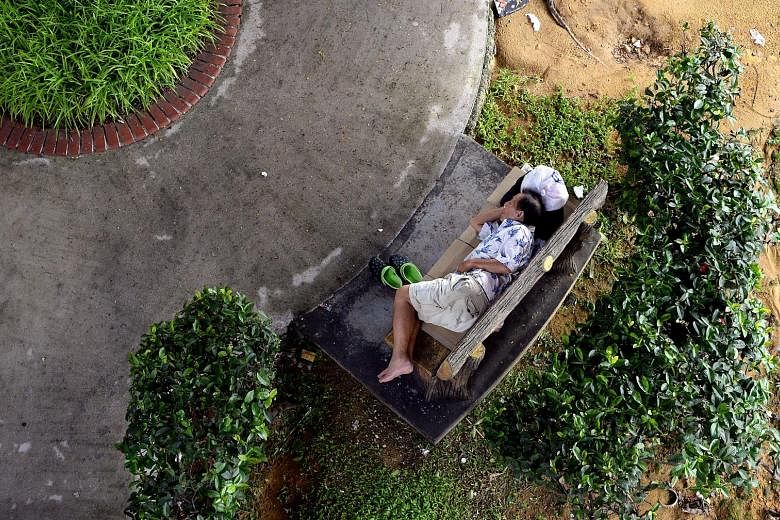Drop in number of homeless cases in last three years
About 300 homeless individuals and families were helped each year by the Ministry of Social and Family Development (MSF) from 2005 to last year.
But over the past three years or so, the number of homeless cases has fallen slightly, said Parliamentary Secretary for Social and Family Development Muhammad Faishal Ibrahim yesterday. The ministry handled 296 cases last year, compared with 321 cases in 2013.
Among those helped, some are able to return to their own homes or to their families, he added, responding to Mr Muhamad Faisal Abdul Manap (Aljunied GRC), who asked if there had been an increase in these cases.
Those who are destitute and have no means to fend for themselves are typically placed in welfare homes and transitional shelters funded by the MSF, said Dr Faishal.
-
300
Homeless people helped each year over the past 10 years. The figure has not changed much over the years
-
18,622
Foreign spouses granted long-term visit passes between October 2014 and end of 2015
-
230
Number of applicants under HDB scheme for divorced or widowed parents from May 2013 to May last year
223 divorced and widowed parents allocated HDB flats
A total of 223 divorced or widowed parents who applied for a flat under a scheme to help them were successfully shortlisted for a flat.
Minister of State for National Development Koh Poh Koon said the Housing Board received 230 applications from the time the scheme started in May 2013 until May last year.
Of the successful applicants, 85 had asked HDB for financial assistance, and over half of them received help. Dr Koh said most of them needed help with the resale levy, a fee paid by the buyer to the HDB when purchasing a subsidised flat for the second time.
He also said the waiting time for a rental flat has fallen from 21 months in 2008 to four months last year.
He was responding to questions from Mr Saktiandi Supaat (Bishan-Toa Payoh GRC)and Mr Zainal Sapari (Pasir Ris-Punggol GRC).
Over 18,000 foreign spouses on long-term visit scheme
A total of 18,622 foreigners married to Singaporeans have been granted long-term visit passes between October 2014 and the end of last year, said Parliamentary Secretary for Home Affairs Amrin Amin.
With the passes, issued under the Long-Term Visit Pass and Long-Term Visit Pass-Plus (LTVP+) schemes, foreign spouses of Singaporeans can stay and work in Singapore.
Those on the LTVP+, introduced in April 2012, can remain in Singapore for longer periods of three to five years and qualify for healthcare and employment benefits.
Replying to a question by Mr Gan Thiam Poh (Ang Mo Kio GRC) on the success rate of applications for the passes, Mr Amrin said about 88 per cent of the 16,738 applications received annually are successful.
70% of complaints on hiring practices involve nationality
The Ministry of Manpower (MOM) does not jump to conclusions that a company is being unfair to its local workers just because they may be reporting to foreigners, said Manpower Minister Lim Swee Say yesterday.
It is only against the law if this arrangement is due to discriminatory practices against local workers, and in such situations, the MOM will take firm action, he added.
Mr Lim said about 70 per cent of the 1,400 complaints the Tripartite Alliance for Fair and Progressive Employment Practices (Tafep) received in the last three years were related to nationality.
He was responding to Mr Saktiandi Supaat (Bishan-Toa Payoh GRC), who asked if the MOM knows of companies that offer lower-grade jobs to locals so as to make the quota required to recruit foreigners for higher-level jobs.
Mr Lim said firm action is taken whenever companies are found to have treated their local workers unfairly in favour of foreign workers. Punishments include suspending or curtailing the rights of firms to employ foreign workers.
But he cautioned against jumping to conclusions about companies just because their Singaporean workers may be reporting to their foreign workers or vice versa.
"There will be areas whereby we do need to create jobs for our rank-and-file workers as well," he said.

